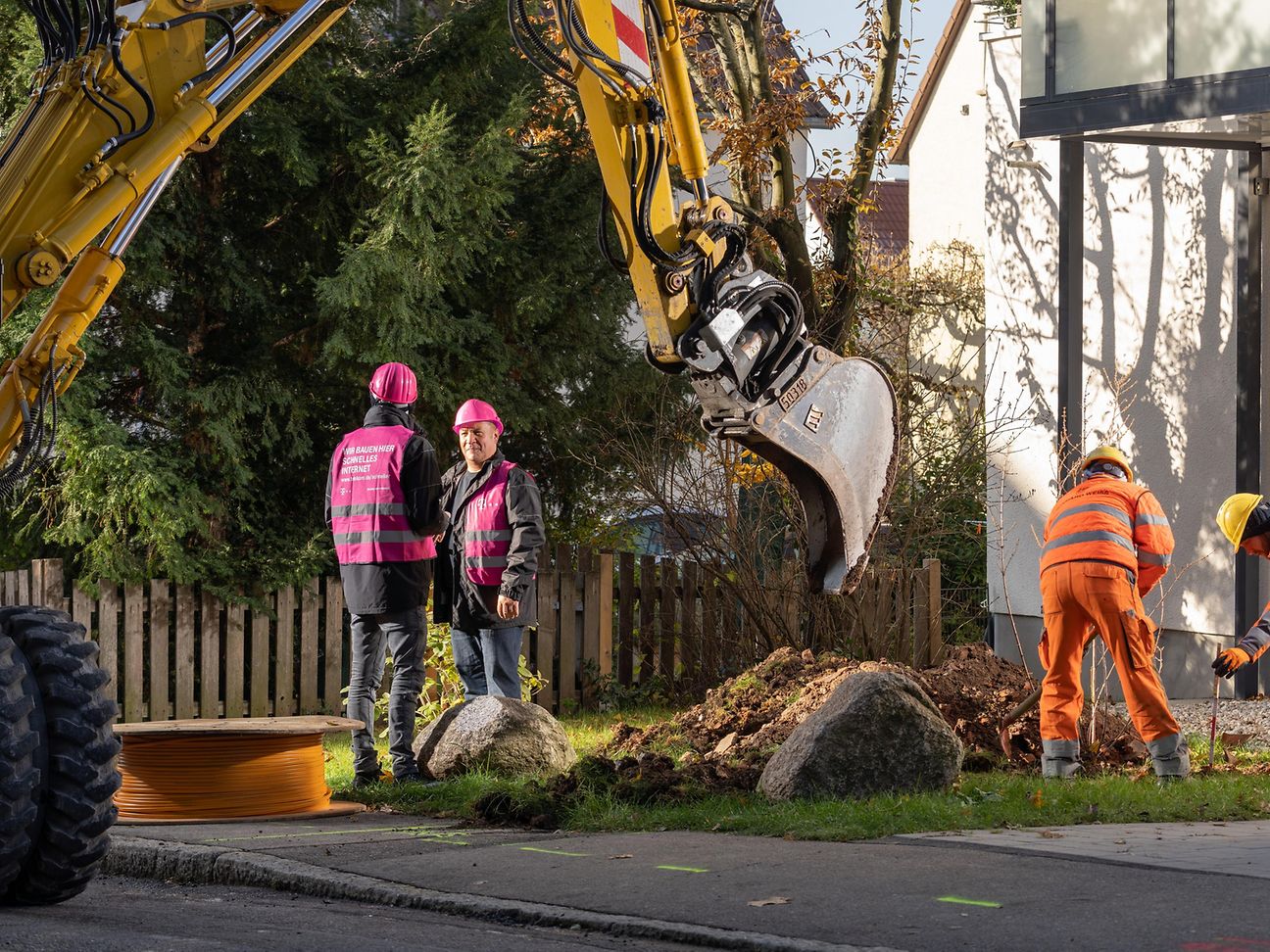The coronavirus crisis has underlined the fact that the economy and society are reliant on high-performance networks, both fixed and mobile. This makes the rapid expansion of 5G and fiber one of the key challenges currently shaping infrastructure policy across Germany. Billions of euros in investments and complex building projects are required. The network operators' expectations are therefore clear - the forthcoming amendment to the Telecommunications Act needs to create an investment-friendly legal environment to simplify and accelerate network build-out.
Act being modernized
Fast, nationwide expansion of gigabit networks is also the German government's declared aim in amending the Telecommunications Act. It also marks the implementation of the European Electronic Communications Code, which entered into force on December 20, 2018 and paves the way for a more modern legal framework in Germany. Issues such as market regulation, approval procedures, frequency policy, consumer protection, and universal service are key points in the forthcoming amendment to the Telecommunications Act. At the same time, the modernization of the Telecommunications Act creates legal foundations for the German government's plans in the coalition agreement. Two ministries - the Federal Ministry for Economic Affairs and Energy and the Federal Ministry of Transport and Digital Infrastructure - are responsible for implementing the EU Code and drafting the Act.
Necessary modification to drive investment in new networks
To carry out the required network build-out, Deutsche Telekom believes that greater scope and legal certainty is required for investment and collaboration projects. Obstacles in the way of expansion also need to be removed. This is the only way it is going to be possible to expand fiber and 5G in Germany. The amendment to the Telecommunications Act will be largely measured by whether it manages to create investment incentives and cut red tape. The burden on investing network operators needs to be reduced and not increased even further.
Deutsche Telekom considers there to be a need for further clarification in some points of the amendment to the Telecommunications Act. One important feature, for example, is a legally binding deadline of three months for approving new cell towers. It would be damaging if the use of an operator's own mobile communications network by another provider at regulated prices and conditions were to be fostered by the Act. This would weaken companies that actually build out networks. National roaming means that no new cell towers will be built and not a single mobile coverage gap in Germany will be closed. The approval procedure also urgently needs streamlining in terms of laying cables and the use of innovative new methods for cable laying needs to be made easier.
If consumers are going to benefit from fiber lines quickly, focus needs to be placed on introducing open-access models that give users greater freedom of choice in terms of products and providers. Open access means that fiber networks are open to third parties - on the basis of freely negotiated conditions that are, however, legally protected.
Discontinuing the transferability of telecommunications costs (the automatic inclusion of cable TV fees in ancillary rental costs) will also give users more freedom of choice. As soon as telecommunications costs are no longer allowed to be included in the rental costs, tenants will have far more choice when selecting their TV and broadband provider - and at fair prices. In addition, the expansion of fiber networks to residences will no longer be blocked.
National Roaming
National roaming refers to the use of a national mobile communications network by another provider whose network does not have nationwide coverage. Where their network is not available, the provider's customers can use the network of another mobile communications provider. It is the same principle we are familiar with from roaming while abroad. When we talk about national roaming, we are referring to a similar approach within Germany.
But only build-out closes gaps in mobile coverage
National roaming agreements have been in place on the German market on a voluntary basis for a long time. Now the calls are getting louder, however, for established network operators to be obligated to provide national roaming. The new operator that joined the market in the last frequency auction in particular is calling for state regulation by the Federal Network Agency as it considers the national roaming conditions offered by the established network operators to be lacking. This is a risky game according to Dirk Wössner, CEO of Telekom Deutschland: "If national roaming is a replacement for own network build-out, then we are doing Germany a disservice. We don't need fuller networks, we need more capacity and better quality. National roaming means that no new cell towers will be built and not a single mobile coverage gap in Germany will be closed.
The explanation is simple - if the use of an operator's own mobile communications networks by another provider at regulated prices and conditions were to be made compulsory, the companies that actually build out networks would be weakened. Roaming would make investing in infrastructure, e.g., in rural areas, an entirely unattractive option. No operator is going to build expensive new sites in sparsely populated areas if a competitor can then come along and use them as a matter of course at regulated terms and conditions.
A string of voluntary agreements has already been established in the mobile communications industry to close mobile coverage gaps in Germany more quickly. Network operators want to work together to provide better service in areas that have so far had no mobile coverage at all or coverage by only one provider. Deutsche Telekom is planning to cooperate with Vodafone and Telefónica, for example, to bring service to areas with little or no coverage. These cooperation agreements are also open to other market players. The crux of it is that making costly investments in their own network must be made worthwhile for every network operator. Building a single mobile communications mast alone costs around 200,000 euros.
Privilege of automatic inclusion of cable TV fees in ancillary rental costs
What is the privilege of automatic inclusion of cable TV fees in ancillary rental costs?
The landlord decides which cable provider should supply the residence. This applies to around 12.5 million tenants in Germany, who have no control over the choice of provider or the services included. The fees are charged as part of their ancillary rental costs.
Deutsche Telekom's stance
We welcome the intended discontinuation of the privilege of automatic inclusion of cable TV fees in ancillary rental costs as this relic from the 80s is one of the biggest obstacles to faster fiber build-out. The compulsory charge for a copper television cable from the last century, which around 12.5 million tenants are forced to pay, needs to be abolished.
Doing so will cuts costs for consumers and give them a wider choice of TV products.
Including cable TV fees in ancillary rental costs is hugely obstructing fiber build-out in Germany and creating no incentives to upgrade to fiber in residences. And we do not consider this practice to be compatible with EU law.
Further arguments
The Monopolies Commission has been calling for the privilege of automatic inclusion of cable TV fees in ancillary rental costs to be abolished for years now, most recently in an article in the FAZ newspaper on August 26, 2020. The Commission has laid out in a number of reports just how badly the practice is holding back broadband expansion in Germany.
Consumer protection groups call the privilege of automatic inclusion of cable TV fees in ancillary rental costs a contract at the expense of third parties. As landlords do not have to pay the costs themselves, but simply pass them on to tenants, they have no interest in making sure they select the best or cheapest provider. Which is why Michael Gundall from the Verbraucherverband Rheinland-Pfalz consumer protection organization is calling for the privilege to be abolished - it is time for the cable network operators' "cash cow" to be led to the slaughterhouse. That's what the cable operators are really scared of - losing a business model that allows them to generate plenty of money with very little effort. Since 1998, consumers have been able to choose their telephone provider. The energy market was also liberalized and consumers are free to choose their own electricity and gas providers. The government failed, however, to give consumers freedom of choice as far as TV reception is concerned. Contracts continue to be concluded between cable operators and the housing industry that sacrifice consumers' interests.
Prof. Torsten Körber from the University of Cologne also calls for the privilege to be abolished. It is ultimately "an authorization to conclude contracts at the expense of third parties - the tenants - and therefore the very opposite of tenant protection. While the new telecommunications law gives tenants the freedom to choose their internet provider, use the signals delivered however they wish and choose which devices (routers) they use, this freedom of choice is a luxury reserved for home owners in the TV sector. Tenants in larger rental properties are encumbered by cable fees without any choice in the matter simply because the landlord has opted for a cable connection for the entire property."
Right to high-speed internet
Deutsche Telekom is pushing forward massively with broadband build-out in Germany. The company is investing several billion euros a year in fixed-network build-out and mobile communications. 33.0 million households in the Deutsche Telekom network can now subscribe to a rate plan offering up to 100 megabits per second (Mbit/s) or higher. 24.3 million households can purchase a rate plan with speeds of up to 250 Mbit/s or higher. Around 1.8 million households now have fiber-to-the-home lines, supporting speeds of up to one gigabit per second. Over the next few years, the plan is to roll out two million new fiber-optic lines a year and provide 99 percent of the population with 5G coverage through 2025.
In Deutsche Telekom’s view, broadband build-out in Germany will progress particularly if legislators smooth the way for the necessary investment in ground work and mobile communications masts. Network operators therefore expect the amendment to the Telecommunications Act to create, above all, an investment-friendly, coherent legal framework. This includes implementing more streamlined approval processes for network build-out locally. The end user’s demand for access to telecommunication services cannot remove existing obstacles to broadband build-out. Rather, such a demand could even delay universal FTTH build-out where meeting these individual demands ties up scarce build-out resources. A technology-neutral approach is therefore crucial. In this way, the fixed network, mobile communications, and satellite technology can provide the necessary coverage. And, as a result, today’s powerful mobile communications infrastructure could provide coverage for buildings in isolated locations.



